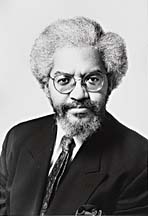Friday, March 31, 2006
Dropping Knowledge: Manning Marable and Russell Simmons Dialogue on Hip Hop

from The Politics of Hip Hop
By Manning Marable, 2002
"What the essential politics of art is about is the politics of collective imagination, the transformative politics of freeing one’s mind. In a recent interview, KRS-One observed that hip hop is the only place where Dr. Martin Luther King’s `I have a dream’ speech is visible.... Today, with the help of hip hop, they’re all hip-hoppers out there. I mean black, white, Asian, Latino, Chicano, everybody. Hip-Hop has formed a platform for all people, religions, and occupations to meet on something. KRS-One adds, that, to me, is beyond music."

Columbia University Dialogue On Hip Hop and Positive Social Change
Rap Music Provides a Roadmap for Positive Societal Change, Says Def Jam's Russell Simmons in dialogue with Manning Marable, Columbia history and political science professor.
Real (25:08) Audio
In the dialogue, Marable and Simmons also delve into those artistic and personal traits that allowed artists from the first golden age of hip hop to stand apart from the crowd and carve out an audience for the nascent form. Simmons explains why he thought Run DMC and The Beastie Boys had artistic honesty and integrity that was definitely informed by but transcended their ethnic and racial identities. Cultural and artistic honesty is viewed by Simmons as a central value of all great Hip Hop artists.
In the dialogue Russell Simmons tells the funny story of how The Beastie Boys had a rock band called Useless Teenagers and a Rap act and that when he went to see them they wore the same outfit for both acts - red pumas, red suits and red doo-rags and that their approach to hip hop was honest and emerged organically from their experience. Its important also to note, according to Simmons, that Run DMC were featured in Rolling Stone 10 - 15 times before they appeared in Essence or the Black press. So, it was Rock (read white) audiences that first catapulted Hip Hop to national prominence. He said in the interview that before Run DMC, rappers would change out of their outfits, once they were done with their acts, to look more like punks or rockers and that it was Run DMC that finally said no to that and wore their hood uniform, the black leather and such, on and off the stage. In order to be artistically honest, Simmons implies, you can't try and be someone you're not; you can't try and take on a cultural expression that doesn't come naturally to you.


